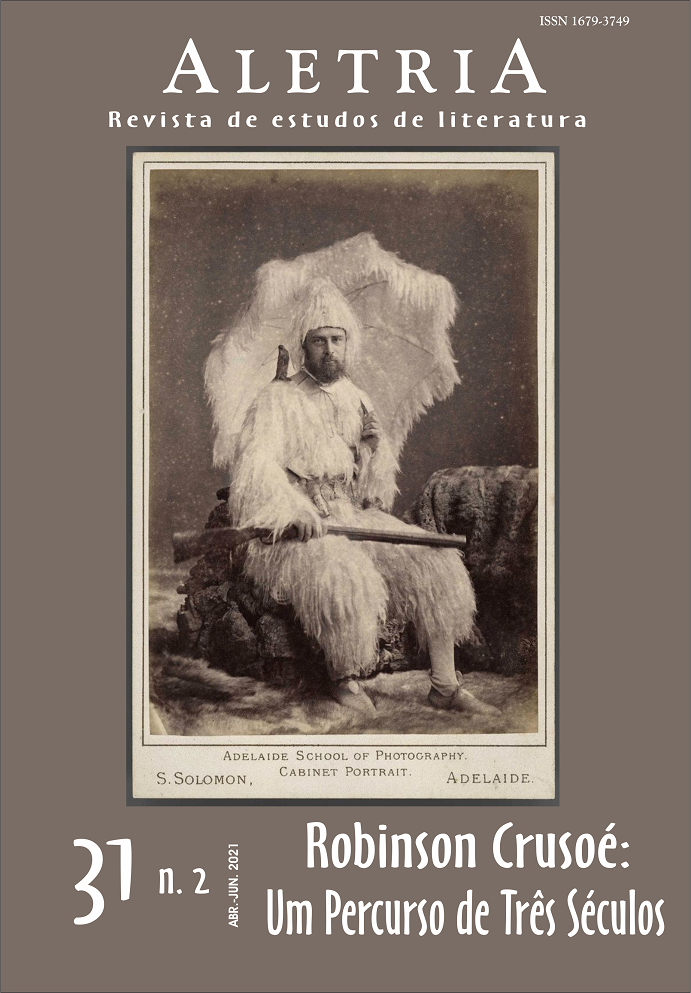“A Matter of Awakening Countervoices”
Fiction, History, and Authorship in J. M. Coetzee’s Foe
DOI:
https://doi.org/10.35699/2317-2096.2021.26553Keywords:
Foe, J.M Coetzee, history, fiction, authorship, theory of historyAbstract
This essay argues that the historical imagination of J. M. Coetzee’s novel, Foe (1987), reaches beyond the notion of historical metafiction. It shows that the nexus between the literary and the historical rests upon the fiction of a past future, situated before the publication of Daniel Defoe’s Robinson Crusoe (1719) and Roxana: The Fortunate Mistress (1724). It is the fiction of an open, undetermined future within the past that allows the novel to contradict the narratives that were eventually fixed by Defoe. Based upon reflections about the theory of history, I suggest that the struggle over authorship and the novel’s’ narrative presupposes the difference between historical experience and literary representation. Besides evoking and objecting to models and codes that shaped literary communication in the eighteenth century, Foe reflects about the limits of representation and the incommensurability of history.
Downloads
References
ATTRIDGE, Derek. Oppressive Silence: J. M. Coetzee’s Foe and the Politics of Canonisation. In: HUGGAN, Graham; WATSON, Stephen (org.). Critical Perspectives on J.M. Coetzee. Nova York: St. Martin’s, 1996. p. 168-190. DOI: https://doi.org/10.1007/978-1-349-24311-2_10
ATTWELL, David. The Problem of History in the Fiction of J.M. Coetzee. Poetics Today, Durham, NC, v. 11, n. 3, p. 579-615, 1990. DOI: https://doi.org/10.2307/1772827
ATTWELL, David. J. M. Coetzee. South Africa and the Politics of Writing. Berkeley: University of California Press, 1993.
CARACCIOLO, Marco. J. M. Coetzee’s Foe and the embodiment of meaning. The Journal of Modern Language, [S.l.], v. 36, n. 1, p. 90-103, 2012. DOI: https://doi.org/10.2979/jmodelite.36.1.90
COETZEE, J. M. What Is a Classic? A Lecture. In: ______. Strange Shores: Essays 1886-1999. Nova York: Penguin, 2002. p. 1-19.
COETZEE, J. M. Preface. In: DEFOE, Daniel. Robson Crusoe. Oxford: Oxford UP, 1999. p. V-XI.
COETZEE, J. M. The Novel Today. Upstream, Montreal, v. 6, n. 1, p. 2, 1988.
COETZEE, J. M. Foe. Nova York: Penguin, 1987.
DEFOE, Daniel. Robson Crusoe. Oxford: Oxford University Press, 1999.
DEFOE, Daniel. Roxana: The Fortunate Mistress. Oxford: Oxford University Press, 2008. DOI: https://doi.org/10.1093/owc/9780199536740.001.0001
DIALA, Isidore. Nadine Gordimer, J. M. Coetzee, and Andre Brink: Guilt, Expiation, and the Reconciliation Process in South Africa. Journal of Modern Literature, Bloomington, v. 15, n. 2, p. 50-68, 2001/2002. DOI: https://doi.org/10.1353/jml.2003.0004
GALLAGHER, Susan Vanzanten. The Backward Glance: History and the Novel in Post-Apartheid Africa. Studies in the Novel, Baltimore, v. 29, n. 3, p. 376-395, 1997.
HUTCHEON, Linda. The Pastime of Past Time: Fiction, History, Metafiction. In: HOFFMANN, Michael J.; MURPHY, Patrick (org.). Essentials of the Theory of Fiction. Durham, NC: Duke University Press, 2005. p.275-295. DOI: https://doi.org/10.1215/9780822386599-020
JONES, Radhika. Father-Born. Mediating the Classics in J. M. Coetzee’s Foe. Digital Defoe, [S.l.], v. 1, n. 1, p. 45-69, 2009.
KITTLER, Friedrich. The Mother’s Mouth. Discourse Networks, 1800/1900. Stanford: Stanford University Press, 1990. p. 25-69.
KOSELLECK, Reinhart. Historik und Hermeneutik. In: ______. Zeitschichten. Frankfurt a.M.: Suhrkamp, 2000. p. 97-118.
KOSELLECK, Reinhart. Fiktion und geschichtliche Wirklichkeit. Zeitschrift für Ideengeschichte, [S.l.], v.1, n. 3, [1976] (2007), p. 39-54. DOI: https://doi.org/10.17104/1863-8937-2007-3-39. Disponível em: https://www.z-i-g.de/pdf/ZIG_3_2007_koselleck.pdf. Acesso em: 10 nov. 2020.
LÓPEZ, María J.; WIEGAND, Kai. Introduction: J. M. Coetzee, Intertextuality and the Non-English Literary Traditions. European Journal of English Studies, [S.l.], v. 20, n. 2, p. 113-126, 2016. https://doi.org/10.1080/13825577.2016.1183422.
MARAIS, Michael. Interpretive Authoritarianism: Reading/Colonizing Coetzee’s “Foe”. English in Africa, Grahamstown, SA, v. 16, n. 1, p. 9-16, 1989.
MARSHALL, David. Friday’s Writing Lesson: Reading Foe. In: Clymer, Lorna; Mayer, Robert (org.). Historical Boundaries, Narrative Forms: Essays on British Literature in the Long Einghteenth Century in Honor of Everett Zimmerman. Newark: University of Delaware Press, 2007. p. 225-251.
MCDONALD, Peter D. The Writer, the Critic and the Censor: J. M. Coetzee and the Question of Literature. Book History, Durham, NC, v. 7, p. 285-302, 2004.
MUKHERJEE, Ankhi. The Question of the Classic. In: ______. What Is a Classic?: Postcolonial Rewriting and the Invention of the Canon. Stanford: California University Press, 2014. p. 27-78. DOI: https://doi.org/10.11126/stanford/9780804785211.003.0002
SPIVAK, Gayatri Chakravorty. Theory in the Margin: Coetzee’s Foe Reading Defoe’s Cursoe/Roxana”. English in Africa, Grahamstown, SA, v. 17, n. 2, p.1-23, 1990.
TURK, Tisha. Intertextuality and the Collaborative Construction of Narrative: J.M. Coetzee. Narrative, [S.l.], v. 19, n. 3, p. 295-30, 2011. DOI: https://doi.org/10.1353/nar.2011.0019
Downloads
Published
How to Cite
Issue
Section
License
Copyright (c) 2021 Luciana Villas-Bôas (Autor)

This work is licensed under a Creative Commons Attribution 4.0 International License.
Authors who publish with this journal agree to the following terms:Authors retain copyright and grant the journal right of first publication with the work simultaneously licensed under a Creative Commons Attribution Non-Commercial No Derivatives License that allows others to share the work with an acknowledgement of the work's authorship and initial publication in this journal.Authors are able to enter into separate, additional contractual arrangements for the non-exclusive distribution of the journal's published version of the work (e.g., post it to an institutional repository or publish it in a book), with an acknowledgement of its initial publication in this journal.Authors are permitted and encouraged to post their work online (e.g., in institutional repositories or on their website) prior to and during the submission process, as it can lead to productive exchanges, as well as earlier and greater citation of published work (See The Effect of Open Access).





